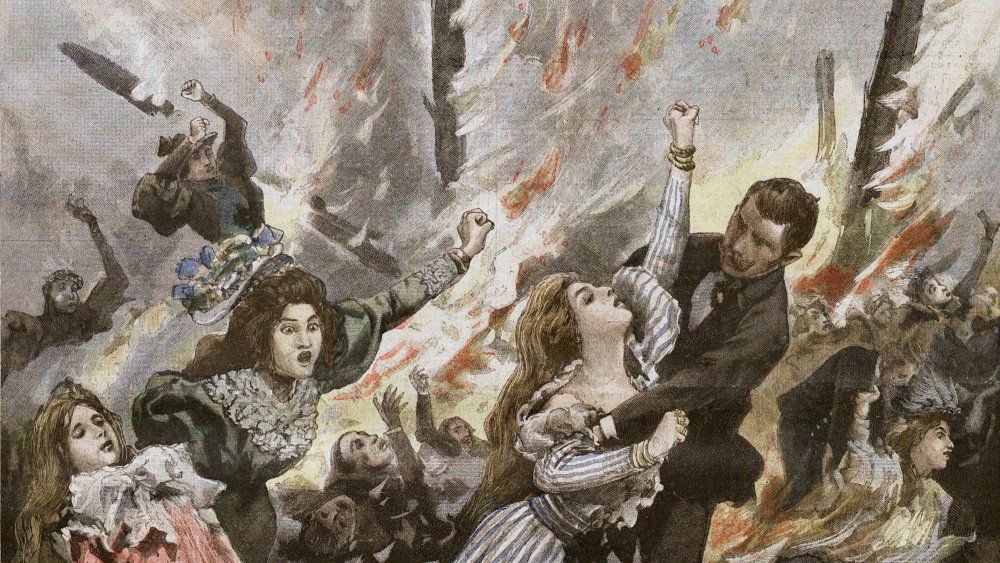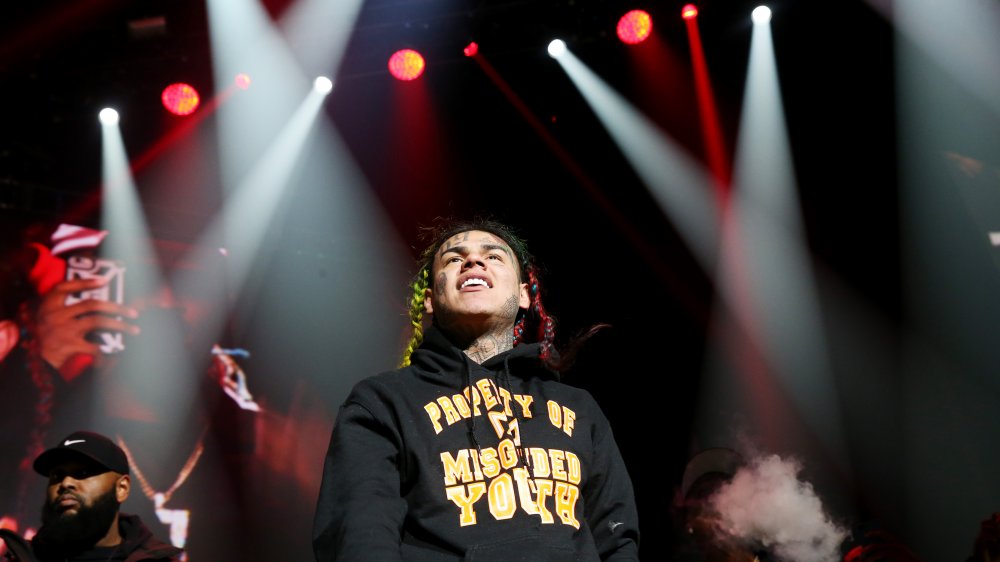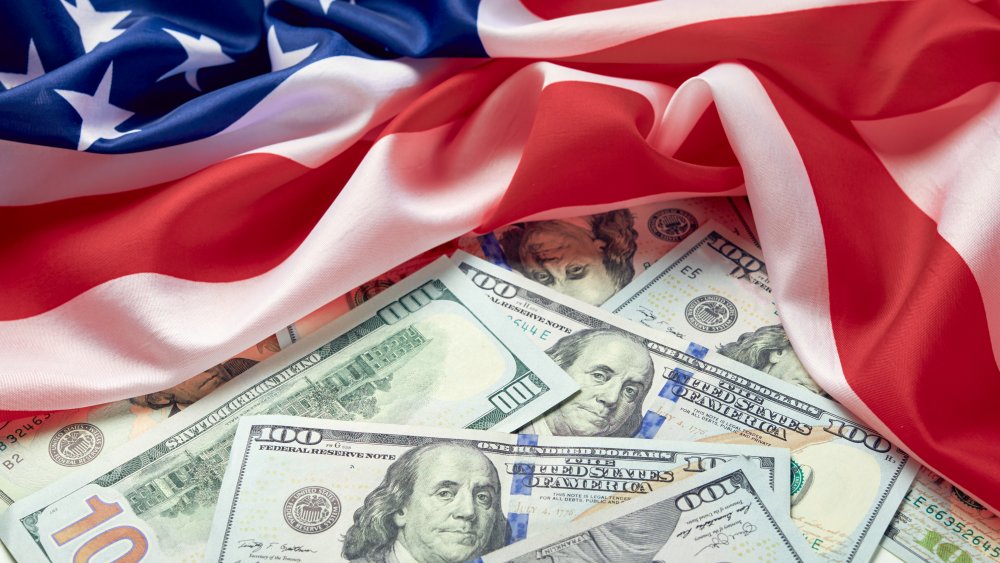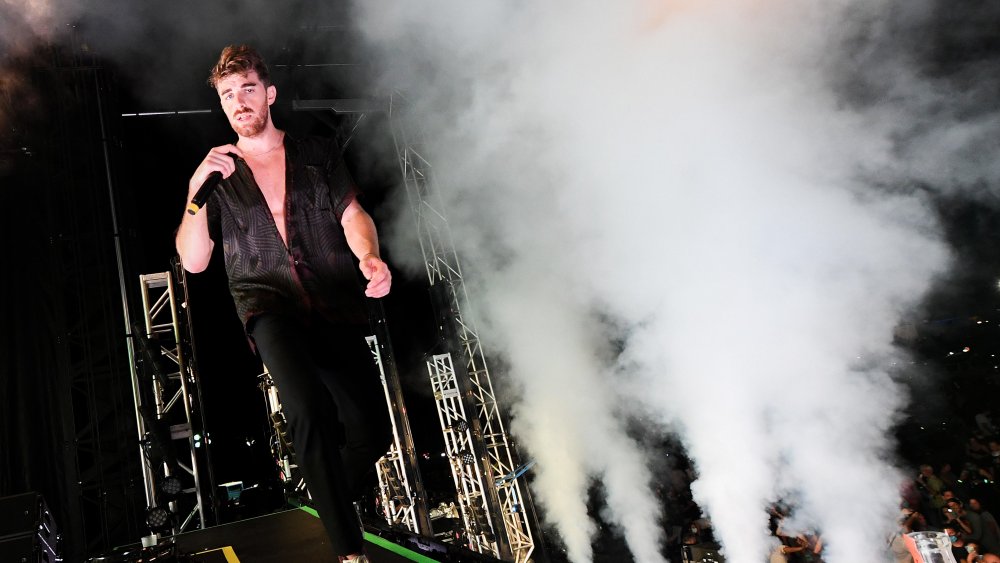Charity Events That Turned Into Total Disasters
Everyone loves a good fundraiser.
A charity event puts everyone to work toward a common goal. Whether raising money for underprivileged children, rehoming abandoned pets, or helping out the victims of a disaster, a charitable event is usually for something that no one can argue about. In this Coke-vs.-Pepsi, TikTok-vs.-Tumblr, Superman-vs.-Batman world, that means a lot.
But charity events are still developed by people. And people make mistakes. Every once in a while a charity event occurs that is a disaster unto itself — something that people might very well need another charitable event to recover from. Sometimes people are scammed. Sometimes the money gets stolen. Sometimes people straight up die. And just like any event, the grander the scale of the event itself, the more opportunities there are to really mess up.
Here are some of the biggest, grandest, charity disasters.
United Way of Cleveland caused mass chaos by releasing 1.5 million balloons
It's not often that a charity event actually kills someone — let alone two. In 1986, United Way of Cleveland released 1.5 million balloons at once, achieving a Guinness World Record. But the balloons didn't just soar into the sky. They also came down. Balloons caused car accidents, frightened horses, settled in the ocean, and even led to the death of two missing boaters.
Most of the damage was indirect. On the day of the balloon incident, two fishermen had gone missing — and because of the balloons scattered around, the Coast Guard could not see their boat. The bodies of the men eventually washed to shore. The wife of one of the men sued for over $1 million, settling for an undisclosed sum out of court.
Of course, the pictures of the event are incredible — though probably not worth the loss of life. And it did raise quite a bit of money, with individuals purchasing two balloons at once for $1. But that doesn't mean that the consequences of the balloon release shouldn't already have been obvious.
People have been pretty flippant about just releasing trash into the world for a long time. Balloon releases have a fairly notorious reputation overall and have consequently been discouraged for all events, including charitable ones.
A Toys for Tots distribution ended in fistfights
Toys for Tots is practically a mainstay of the holiday season. But the holidays can already be pretty stressful, even without having to rely upon a charity to follow through. Every year, people get into fights over the last toy in a shop. Toys for Tots promises toys to those who may not otherwise be able to get anything at all, and that leads to significantly higher stakes.
In this particular situation, while the intent may have been well-meaning, the application was poor. During a Toys for Tots distribution in Detroit in 2017, multiple fistfights broke out — after parents were left waiting for hours not knowing whether they were going to receive the toys they had applied for. Many left empty-handed. And the issue was purely an organizational one. Toys for Tots is a large enterprise with a lot of pull.
Toys for Tots fundraisers usually go off without a hitch, providing millions of toys for underprivileged families. It's still a great charity for people to donate to, but it just goes to show that anything can be ruined with a little lack of planning. And when it comes to the holiday season, it's never a good idea to fall short on things that have been promised.
The 1897 Charity Bazaar Fire of Paris led to 126 dead and 150 people injured
In 1897, a four-day charity event in Paris left hundreds of people dead or injured after a fire spread through the town. The fire started on the second day of the event and quickly consumed much of the bazaar and the surrounding buildings. Since firefighting procedures of yesteryear weren't what they are today, the damage was significant. But perhaps more interesting than the carnage was the charity bazaar itself.
Most are used to thinking of "celebrity fundraisers" as a new invention. But they certainly aren't. Even back in the 1800s, the aristocracy would raise money for charities by selling their goods. During the 1897 charity bazaar, it's estimated that around 1,800 individuals were in attendance. Certainly not a number to scoff at during the earliest days of telephones.
The origin of the fire is said to have been a cinematograph, which was showing moving pictures and running on a combination of oxygen and ether. When a match was lit, the cinematograph's fuel went up in flame, and the surroundings along with it. Since the entire bazaar was filled with flammable items — such as clothing — and the quarters were so packed, it wasn't long before everything was alight.
While a disaster, something did come of the bazaar fire. It highlighted the need for better fire and safety standards for such events. Notably, some doors at the bazaar opened inward, slowing people as they tried to escape.
A charity meal service once sent out dog food to seniors
It's true: Canned, instant meals can look a lot like dog food. And premium dog food can look a lot like people food. A charity "meals on wheels" service for seniors once accidentally served dog food rather than people food, leaving the seniors without their Christmas repast. An embarrassing gaffe on the best of days but practically unforgivable during Christmas.
The elderly are some of the most vulnerable during the holiday season. Many individuals simply outlive their family and friends and rely upon a sense of community to celebrate the holidays. Charities like Meals on Wheels deliver food to the elderly (and often to their pets) to make sure they don't go without — and, perhaps more importantly, to make sure they know they aren't forgotten.
Because charities like these do collect pet food as well as human food, it's perhaps more understandable that an error like this could occur. The donations are being collected and processed by volunteers and sometimes even warehoused in the same place.
This particular issue, which occurred in 2015, was due to a misunderstanding with the labeling – a delicious meal of "venison and potatoes with garden vegetables" was marked, smaller, as a "gourmet food for animals." Some premium dog foods are now virtually indistinguishable from, at least, baby food. And some modern pet food recipes are perfectly edible by people. You'll just want to add some salt.
Stars of "Red Nose Day" were accused of playing white savior
Sometimes it's less about what actually happens and more about the optics.
Red Nose Day is a campaign against child poverty. Celebrities and businesses contribute to programming on NBC as a way to fundraise money for the underprivileged. According to the organizers of Red Nose Day, it's raised over $230 million since inception. But because it's also so inextricably linked with the entertainment industry and NBC (both known for self-promotion), some are naturally skeptical.
It's always a little dangerous when celebrities and businesses start raising money for the underprivileged, especially when it is assumed that they are doing it for positive press rather than out of genuine morality. How can anyone know that the money is really being used to its fullest extent? So, it's perhaps no surprise that in 2019, Comedy Relief's charity films were accused of playing into "white savior" tropes, after a series of bad public relations moves. Smiling white faces were seen holding assumedly impoverished black children — an image that the world was understandably uncomfortable with.
Apart from doing the right thing, the public also wants to know that people are doing the right thing for the right reasons. And that's why so many celebrities ultimately end up giving to charity anonymously. It's just not worth the scrutiny.
The Darren Waller Foundation charity event was panned for going maskless
Speaking of bad PR, there have been multiple charities that have gotten flak within recent months for not adhering to COVID-19 guidelines. When Raiders players were seen at a Darren Waller Foundation fundraiser unmasked during COVID-19, it caused enough furor to overshadow the meaning behind the event.
The NFL has its own COVID-19 protocols, which is easy to understand. Millions upon millions of dollars are riding upon the players within the NFL, so they are contractually obligated to avoid COVID-19 whenever they can. Thus, on top of the bad press, there were also tons of fines.
While the fundraiser ultimately raised more than $300,000, Waller himself was fined $30,000 for the violation of the league's own COVID-19 protocols. Other players received a $15,000 fine for attending. As ten players were confirmed to have attended and been fined, the fines themselves amounted to more than 50 percent of the funds raised. But with some of these stars making millions of dollars, that might not be as much as it seems.
As for the foundation itself, the Darren Waller Foundation raises money for community outreach. So, it's understandable why running a high-risk gala could seem to be at odds with its stated mission.
The Cuddles charity was given money by a fancy dress pub crawl in blackface
One problem with charity is that you can't necessarily control who fundraises on your behalf — and accepting some donations just isn't worth it. In 2020, rapper 6ix9ine had his $200,000 donation rejected by the No Kid Hungry campaign — who didn't believe that the rapper fit its values.
While some believe that charities should consider taking donations even from less-than-ideal donors — after all, money is money, and no money is perfect — there are times when the donation simply isn't worth the moral plight.
The Cuddles charity found itself in this situation during the holiday season of 2018. Cuddles is a charity for sick children, and it could certainly use all the money it could raise. But the charity found itself aghast when a fancy dress pub crawl raised $1,000 in funds for it — while dressed in blackface.
Trustees for the charity took to Facebook and called the act "deeply offensive." Unlike rapper 6ix9nine's donation, the donation wasn't refused simply because of who it came from but how it was acquired. After all, once you start accepting donations raised through specific acts, you start encouraging those acts.
The World Health Organization's COVID-19 fundraiser was hijacked by scammers
Using cryptocurrency, scammers created a completely fake page for the World Health Organization's fundraiser for COVID-19. The World Health Organization actually does maintain a COVID-19 Solidarity Response Fund, and the scam undoubtedly led to some confusion. But these types of scams are becoming more common, and a lot of it has to do with the new proliferation of cryptocurrency.
Apart from being an interesting technological tool, cryptocurrency is also an ideal way to send funds without those funds being easily traced. Cryptocurrency is not governed under the same laws as cash, especially internationally. Thus, it's increasingly being used in scams, fake fundraisers, blackmail attempts, and similar endeavors. So much so that the FBI has initiated its own warnings against it.
Most charities won't accept money via cryptocurrency. It's just too dangerous. They could be accepting money from anywhere and anyone. Regardless, it's always a good idea for those who are donating money to go directly to a campaign site rather than selling things to a random bitcoin address.
The World Health Organization is probably big enough that it's not hurting for donations. But it estimates that about $1.7 billion may be needed to see the world through the global COVID-19 pandemic of 2020.
A charity event for veterans got fined for over $2 million for potential impropriety
Even if they mean well, charities can get caught up in red tape. When $2.8 million in money was raised for veterans by a Donald Trump foundation, it was ruled to be an unethical use of funds. Funds raised for charity cannot be in direct control by a political campaign.
Laws like this exist because co-mingling of funds can make it very difficult to determine how the funds were effectively used. When money flows through a political campaign entity, it becomes impossible to tell whether those funds augmented the political campaign itself. Thus, you have situations in which charitable dollars may have been used to further political agendas.
Whether that happened or didn't, the courts gave their ruling. A $2 million fine was assessed — and the money given to such charities as the United Negro College Fund and the U.S. Holocaust Memorial Museum.
As with most of the charities on this list, the most concerning issue isn't what happened — but rather that it was allowed to happen at all. The rules behind how charity funds can be collected and used are very clear and well-known. That being said, quite a few of the foundations on this list ended up with fines or penalties that ate up a significant amount of their contributions. Some charities didn't even make any money at all.
A drunk guy ruined an auction for the American Brain Tumor Association
This one goes out to those who want to run online auctions for charity. It may sound like a great idea, but there are some practical issues involved.
The American Brain Tumor Association found this out for itself after having to re-run its online auctions after a drunk man started bidding high. And this isn't unheard of.
In online auctions, anyone can bid. And it's impossible to tell whether they're serious about their bid. While high-end auctions usually take a down payment for bids, others don't. It's a contractual obligation to purchase an item, but no one can force the person to pay without taking them to court. Even more problematic for the auctioneers, most contracts that are taken out when someone is drunk are unenforceable.
For those who want to run charitable auctions, it's often better to keep them in person. During COVID-19, online auctions may be a little more popular — but they can still be controlled through the use of down payments or proven cash amounts.
Ariana Grande's benefit concert got scalped
When Ariana Grande decided to do a benefit concert in 2017, the tickets sold out immediately. The problem is they didn't sell to people — they sold to bots. All the tickets were immediately sold and ended up on the internet for re-sale.
That's a problem, of course. If a ticket sold for $40 to a scalper and $400 to an audience member, that's $40 that went to charity and $360 that went directly into the scalper's pocket.
Scalpers have been getting increasingly more refined in their abilities to purchase large volumes of tickets at once. Ticket scalping is a huge problem within the entertainment industry because it drives up prices without any of the money going to the entertainers themselves. Ever since online ticket sales became popular, scalping has been a major issue.
In this situation, the venue did attempt to cancel as many scalped tickets as possible, so they could go directly to concert-goers. And in the future, many venues are working toward trying to identify scalpers before they even finish the purchase process.
Chainsmoker's charity fined $20,000 for violating New York COVID-19 policies
No one wants to run a charitable event that could actually kill people later on. Though the band Chainsmokers did ask for people to adhere to social distancing, they did not — which led to the event being fined $20,000. New York (understandably) had some very strict COVID-19 policies in place at the time, which virtually any large gathering would have run afoul of.
Social media videos have made it much harder for charitable events to get around breaking the law. Decades ago, it would be difficult to prove that any organization was breaking COVID-19 guidelines. Today, it's just an Instagram away.
Not only was the gathering non-essential, but it was also too tightly packed. The Department of Health was forced to hold an investigation, under the orders of Gov. Andrew Cuomo. The concert itself was supposed to be a socially-distanced benefit show that was targeted toward vehicles. If it had remained a drive-in, it probably would have been fine. According to those who actually attended, no pretense was given that the vehicles were actually to be used.
Charitable events usually have their heart in the right place. But when they're handled incorrectly, they can end up hurting rather than helping. So, rather than end up trapped in an endless loop of charity events for prior charity events, organizers should take a little more time to think about the consequences of their actions.












